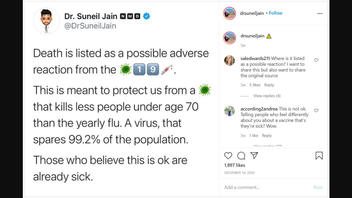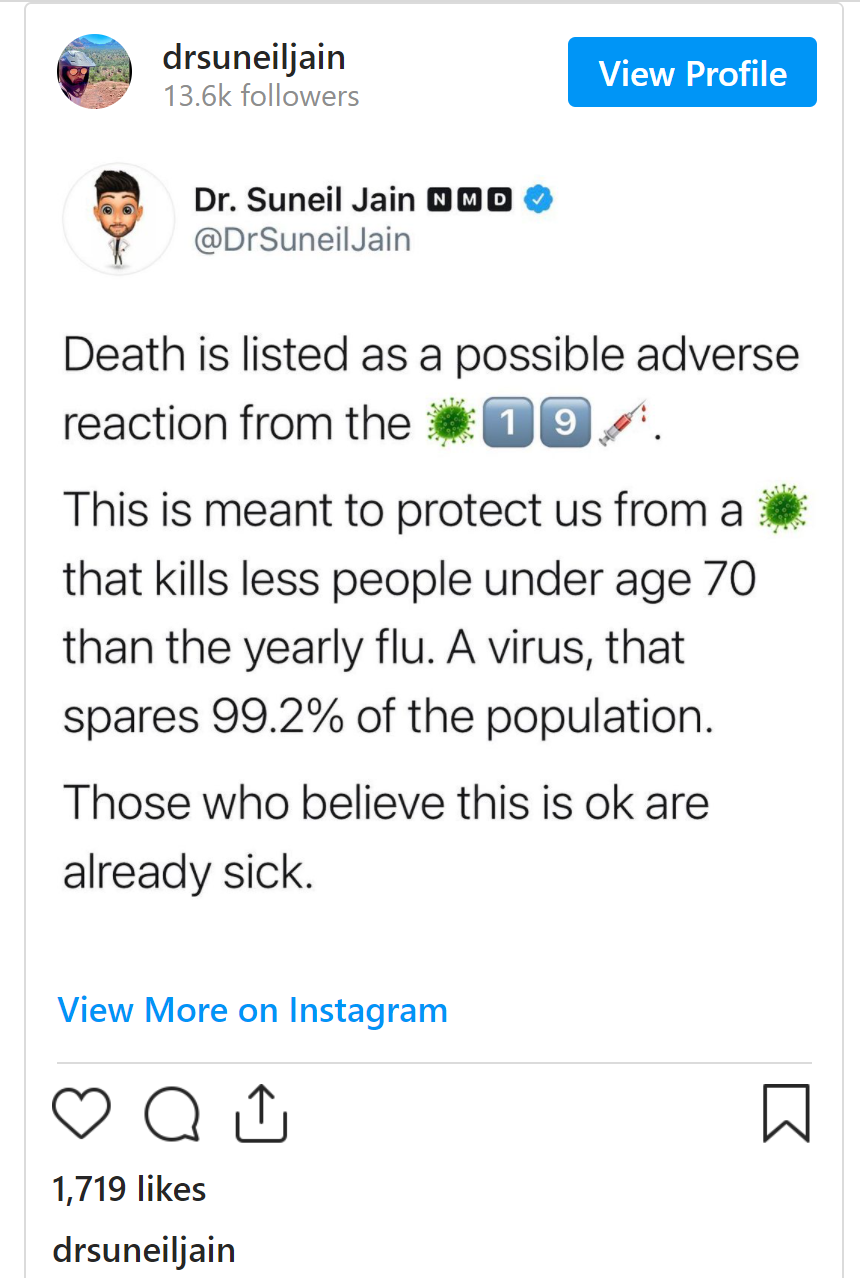
Is death listed as a possible adverse reaction to COVID-19 vaccines in use in the United States? No, that's not true: Neither the Pfizer-BioNTech nor the Moderna COVID-19 vaccines, both of which the Food and Drug Administration have approved, list death as an adverse reaction, according to FDA documents.
The claim appeared in an Instagram post (archived here) published December 14, 2020, which opened:
Death is listed as a possible adverse reaction from the COVID-19 vaccine [COVID-19 vaccine expressed with emojis]
(Source: Instagram screenshot taken on Tues Dec. 15 10:30:29 2020 UTC)
The most common adverse reactions to the Moderna COVID-19 vaccine were "pain at injection site (91.6%), fatigue (68.5%), [and] headache (63.0%), according to the FDA briefing document. Serious adverse events, which the briefing document said were "uncommon," included nausea and vomiting that were difficult to control and also facial swelling. The trial had 30,420 participants.
The only deaths occurred were in the placebo group, according to an overview of FDA documents done by the COVID-19 Real-Time Learning Network, which is funded by the Centers for Disease Control and Prevention and run by The Infectious Diseases Society of America (IDSA). Bell's palsy, a temporary drooping of one side of the face, occurred in a handful of participants, the overview states:
Bell's palsy occurred in the vaccine group (3 participants [<0.1%]) and the placebo group (1 participant [<0.1%]) during the observation period of the trial (more than 28 days after injection).
The briefing document for the Pfizer-BioNTech COVID-19 vaccine listed the most common adverse reactions as "injection site reactions (84.1%), fatigue (62.9%), [and] headache (55.1%)." The trial included more than 43,000 participants. The COVID-19 Real-Time Learning Network said that a small number of participants developed Bell's palsy:
Four participants in the clinical trial who received the vaccine later developed Bell's palsy. These cases occurred at 3, 9, 37, and 48 days after vaccination. The observed frequency of reported Bell's palsy in the vaccine group is consistent with the expected background rate in the general population, according to the FDA.
No deaths were considered by the investigators to be related to the vaccine or placebo.
Dr. Lauren Southerland, an emergency medicine physician at The Ohio State University Wexner Medical Center, explained, in an email to Lead Stories, what goes on in a clinical trial:
When we are researching any new intervention, we catalogue every symptom and problem that someone has up to and including death. For instance, if I am doing a trial of a new antibiotic, there is always the concern that there could be some rare side effect so we log anything that happens to someone - hospitalizations, gallbladder surgeries, toenail pain. Then, they look at the two groups- the people who did get the drug and those that didn't. Random things like car accidents and heart attacks should be even in the two groups. For instance, about an equal number of people in the Pfizer vaccine trial had appendicitis in the two groups, so that probably isn't related to getting the vaccine and is more just do to the fact that anyone can get appendicitis.
Additionally, we look at each case and judge whether it is vaccine related or not. If one of my research participants comes into the hospital 2 days after joining a study due to a car accident, that probably isn't related to the drug. But if the drug can cause drowsiness and I call the participant and they say, "Oh, I have been feeling really tired and I can't remember what happened during the accident", then I would list it as potentially related to the study drug.
Southerland wrote that drug manufacturers don't get to decide on their own whether "a health event a participant experiences is due to the vaccine or not."
These judgements are made by a group according to predefined criteria, and involve a Data Safety Monitoring Board which is a group of scientists and regular people not on the study or financially involved with it who do these types of reviews.
On January 6, 2021, the CDC reported 21 cases of Anaphylaxis, "a severe, life-threatening allergic reaction that occurs rarely after vaccination," in people who had received the Pfizer-BioNTech COVID-19 vaccine:
During December 14-23, 2020, monitoring by the Vaccine Adverse Event Reporting System detected 21 cases of anaphylaxis after administration of a reported 1,893,360 first doses of the Pfizer-BioNTech COVID-19 vaccine (11.1 cases per million doses); 71% of these occurred within 15 minutes of vaccination.
The CDC is investigating the death of a Florida doctor, who died less than a month after getting the Pfizer-BioNTech COVID-19 vaccine, but "it's not yet clear whether his death Monday was related to the shot he received," USA Today reported January 6, 2021.
The Instagram post claims that flu is deadlier than COVID-19. However, Johns Hopkins University & Medicine in Baltimore, Maryland, which tracks coronavirus cases in the U.S. and globally, says it has been a mild flu season, so far. A January 12, 2021 post on its web says that "as cases of COVID-19 have soared in the U.S. over the past few weeks," cases of the flu have "remained extremely low."
Flu season typically peaks between December and February each year. The Centers for Disease Control and Prevention estimates that the flu causes up to 45 million illnesses, up to 810,000 hospitalizations and up to 61,000 deaths each year. But this flu season, there have been just 925 cases of the flu around the U.S so far.
"Though caused by a different virus from the one that causes COVID-19, the flu is also a respiratory viral disease, so everything we are doing to slow transmission of COVID-19, such as wearing face masks, frequent handwashing and physical distancing, should also reduce transmission of flu," says Eili Klein, Ph.D.
The Instagram post says that flu is more deadly in people under 70 than COVID-19. Such a comparison could be difficult to prove based on available data on the CDC website. First, CDC data isn't kept by "less than age 70" years old and "more than 70" years old. There are more specific age groupings, such as 55 to 64 years old. Secondly, making such a detailed comparison between flu and COVID-19, would most likely require using the agency's comprehensive flu report, which comes out after the flu season has ended. (There are weekly reports with preliminary numbers and less detail.) The latest report is for the 2018-2019 flu season. The first cases of coronavirus didn't appear in the United States until early 2020. The assumption in the Instagram post that COVID-19 is more deadly to older people is accurate. Of the 329,593 people in the U.S., who died of COVID-19 as of January 13, 2020, 266,647 were 65 and older.
Dr. Eric Adkins, an associate professor of Emergency Medicine and Critical Care Medicine and vice chair for Clinical Affairs in the Department of Emergency Medicine at The Ohio State University Wexner Medical Center in Columbus, showed that COVID-19 was more deadly than flu, in all age groups, In a December 2020 interview with Lead Stories he said:
"Influenza Mortality data from 2018 show that 3.4 people die per 100,000. The current COVID data suggest that about 94 people per 100,000 -- the same normalization factor -- are dying from COVID.
Adkins also challenges the assumption made in the Instagram post that people under 70 have little to worry about. He said everything from masking up to getting vaccinated is part of "a big picture strategy of trying to reduce the spread" of the virus.
I understand that in young people and middle age people, COVID may not have that big of an impact, but that is not a reason or an excuse to minimize the impact of the disease. You could hug your mom or your father or your grandmother or your grandfather. And if you've got COVID, and they get exposed to it, you could kill them


















